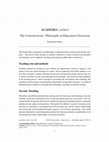Drafts by emmanuel imiere

Teaching philosophy involves a variety of learning activities. The primary focus of the learning ... more Teaching philosophy involves a variety of learning activities. The primary focus of the learning process is on concepts and its components identification and relationships. Computer visualization techniques, such as computer graphics, animation and virtual reality can be used to graphically illustrate the various concepts and its components identification and relationships in philosophy.I propose a virtual apprenticeship model for the knowledge-and skills-oriented Webbased education for philosophy students. I adapt the classical cognitive apprenticeship theory to the Web context utilizing scaffolding and activity theory. The study reveals how web based teaching techniques, computer programs and collaborative software can aid online or blended philosophy instruction and facilitate discussion and collaborative work. The study offered intriguing insights and implication for developing and designing philosophy courses and explored alternative and more efficient ways to implement various elements of CA, such as scaffolding and reflection in philosophy. The model provides an excellent medium where students can visually observe, reflect upon, write and discover expert strategies in context.

This article describes how cognitive apprenticeship instructional strategies and technology can b... more This article describes how cognitive apprenticeship instructional strategies and technology can be applied to facilitate rapid learning of philosophy of education course by especially non-specialised (in philosophy) students. These strategies are adopted from the cognitive apprenticeship framework to support students in the development of strategic thinking to learn and understand complex concepts in a constructivist learning environment. They explore the elements of cognitive apprenticeship, scaffolding, mentoring, coaching, exploration and articulation.
On the intersection of technology and cognitive apprenticeship it discusses systematically designed, computer-mediated instruction with the use of innovative software tools that is based in the cognitive apprenticeship theories. The cognitive apprenticeship instructional strategies offer a rigorous and robust approach to teaching complex problem-solving skills and to developing important competencies within the discipline. This process-oriented inquiry I believe can help both preservice and inservice teachers develop their meta cognitive skills . Empirical studies have confirmed much of what these theories suggests. This instructional approach provides the classroom environment on which situated learning strives. The paper concludes with a call for more systematic and integrated program of studies working toward the development of guiding principles to support instructional design, teaching, and learning based on the cognitive apprenticeship model.
Keywords; Cognitive Apprenticeship Scaffolding Modeling Coaching Mentoring Cooperative learning Instructional design
Papers by emmanuel imiere

The goal of this study is to identify major research trends and focus in the field of educational... more The goal of this study is to identify major research trends and focus in the field of educational research. To this end, 22,000 titles consisting of PhD dissertations, journal papers and conference proceedings were retrieved from the ERIC (Education Resources Information Centerhttps://eric.ed.gov/?) database in the period from 2009 to 2018. A topic modeling tool from Google code was downloaded and used for topic analysis, the researcher performed topic modeling for a ten year span and for each year individually using LDA. A total of 1000 keywords extracted from these titles i.e a list of 10 topics comprising of ten words each for each year was generated , which I then labeled with descriptive titles. Both word frequencies and topic modeling were analyzed at the article title level these results were visualized using tableau so that they could be easily understood. A comparison of the extracted topics by LDA with subject headings in education shows that there several distinct sub research domains strongly tied with the field. They include study, student and learning in the domain of ''Student learning''. Professional, education, teacher in the domain of ''Teacher education''. Special, education and support in the domain of special education. Reading and language in the domain of ''reading comprehension and instruction'' Secondly, the results show that there is a markedly strong rise in prominence of topics about special education and an overall dominance of topics on student learning.

Academia Letters, 2021
This model offers a perspective on philosophy of education from an instructional design viewpoint... more This model offers a perspective on philosophy of education from an instructional design viewpoint. The present study attempts to establish conditions in which constructivist principles and strategies can be adapted to teaching and learning of philosophy of education. Teaching role and methods Teaching methods are designed to give students the opportunity to observe, engage in, and invent or discover expert strategies in context. Such an approach will enable students to see how these strategies combine with their factual and conceptual knowledge and how they use a variety of resources in the social and physical environment. The teacher provides guidance in the learning process., directs learning by presenting the environment and technology that stimulates and encourages critical thinking and problem solving skills in learners. I considered methods that get students to articulate their knowledge, reasoning, or problem solving. Socratic Teaching The oldest, and still the most powerful, teaching tactic for fostering critical thinking is Socratic teaching. In Socratic teaching the focus is on giving students questions, not answers. The conceptual model incorporates the Socratic method of inquiring and probing mind by continually probing into the subject with questions. Fortunately, the abilities we gain by focusing on the elements of reasoning in a disciplined and self-assessing way, and the logical relationships that result from such disciplined thought, prepare us for Socratic questioning. The model presents dimensions of questioning that includes the following elements as predictable sets of relationship that hold for philosophy of education literature.











Uploads
Drafts by emmanuel imiere
On the intersection of technology and cognitive apprenticeship it discusses systematically designed, computer-mediated instruction with the use of innovative software tools that is based in the cognitive apprenticeship theories. The cognitive apprenticeship instructional strategies offer a rigorous and robust approach to teaching complex problem-solving skills and to developing important competencies within the discipline. This process-oriented inquiry I believe can help both preservice and inservice teachers develop their meta cognitive skills . Empirical studies have confirmed much of what these theories suggests. This instructional approach provides the classroom environment on which situated learning strives. The paper concludes with a call for more systematic and integrated program of studies working toward the development of guiding principles to support instructional design, teaching, and learning based on the cognitive apprenticeship model.
Keywords; Cognitive Apprenticeship Scaffolding Modeling Coaching Mentoring Cooperative learning Instructional design
Papers by emmanuel imiere
On the intersection of technology and cognitive apprenticeship it discusses systematically designed, computer-mediated instruction with the use of innovative software tools that is based in the cognitive apprenticeship theories. The cognitive apprenticeship instructional strategies offer a rigorous and robust approach to teaching complex problem-solving skills and to developing important competencies within the discipline. This process-oriented inquiry I believe can help both preservice and inservice teachers develop their meta cognitive skills . Empirical studies have confirmed much of what these theories suggests. This instructional approach provides the classroom environment on which situated learning strives. The paper concludes with a call for more systematic and integrated program of studies working toward the development of guiding principles to support instructional design, teaching, and learning based on the cognitive apprenticeship model.
Keywords; Cognitive Apprenticeship Scaffolding Modeling Coaching Mentoring Cooperative learning Instructional design